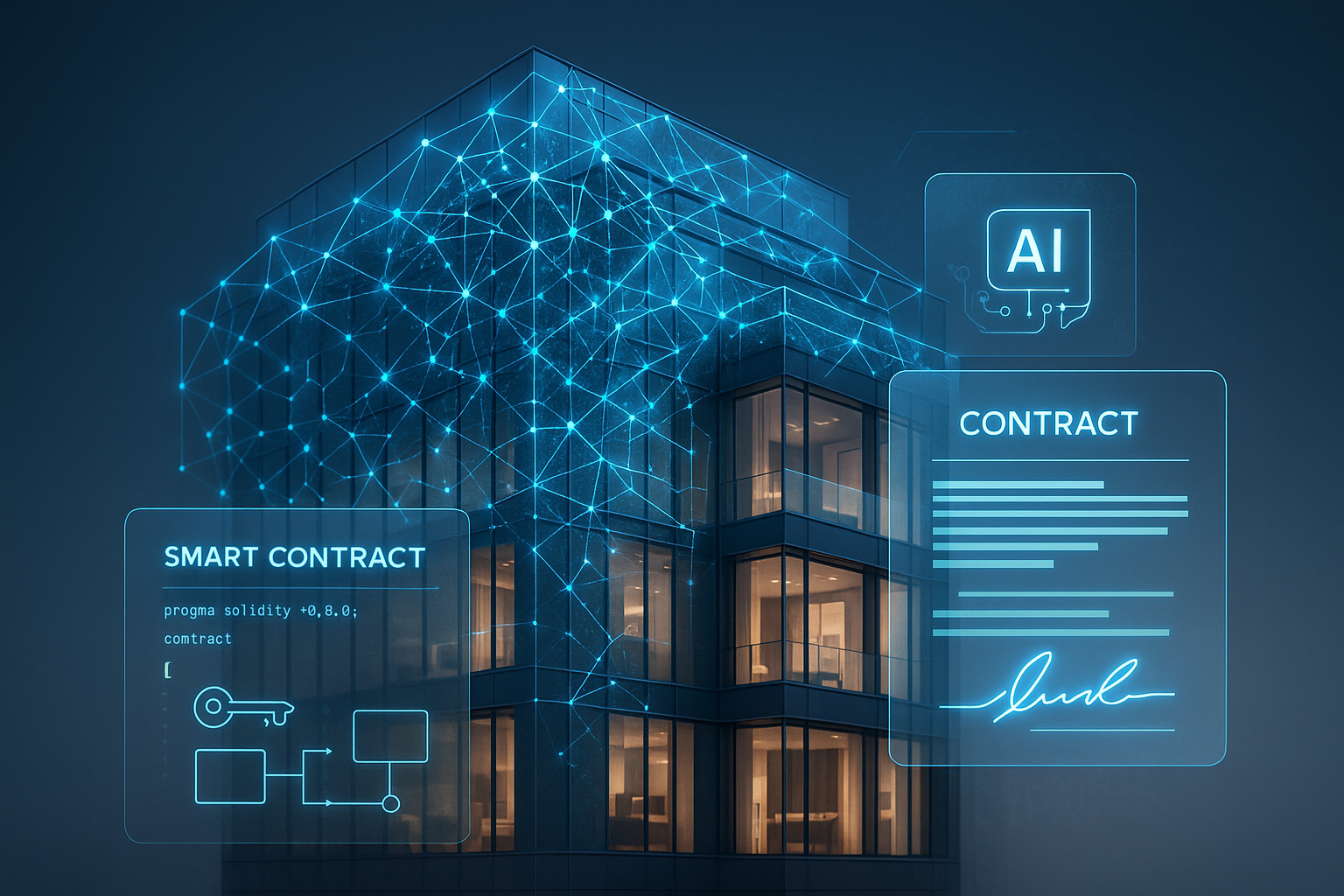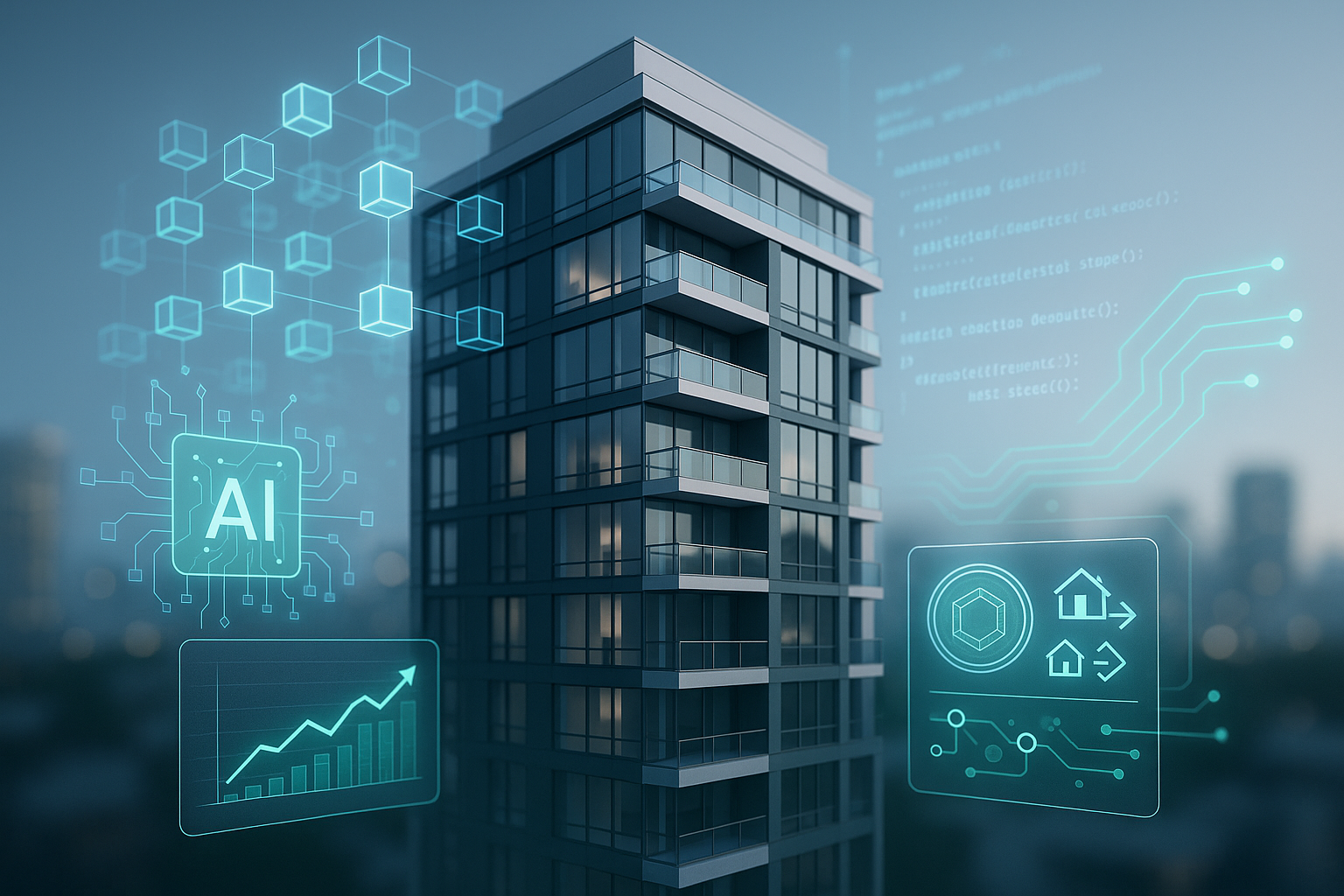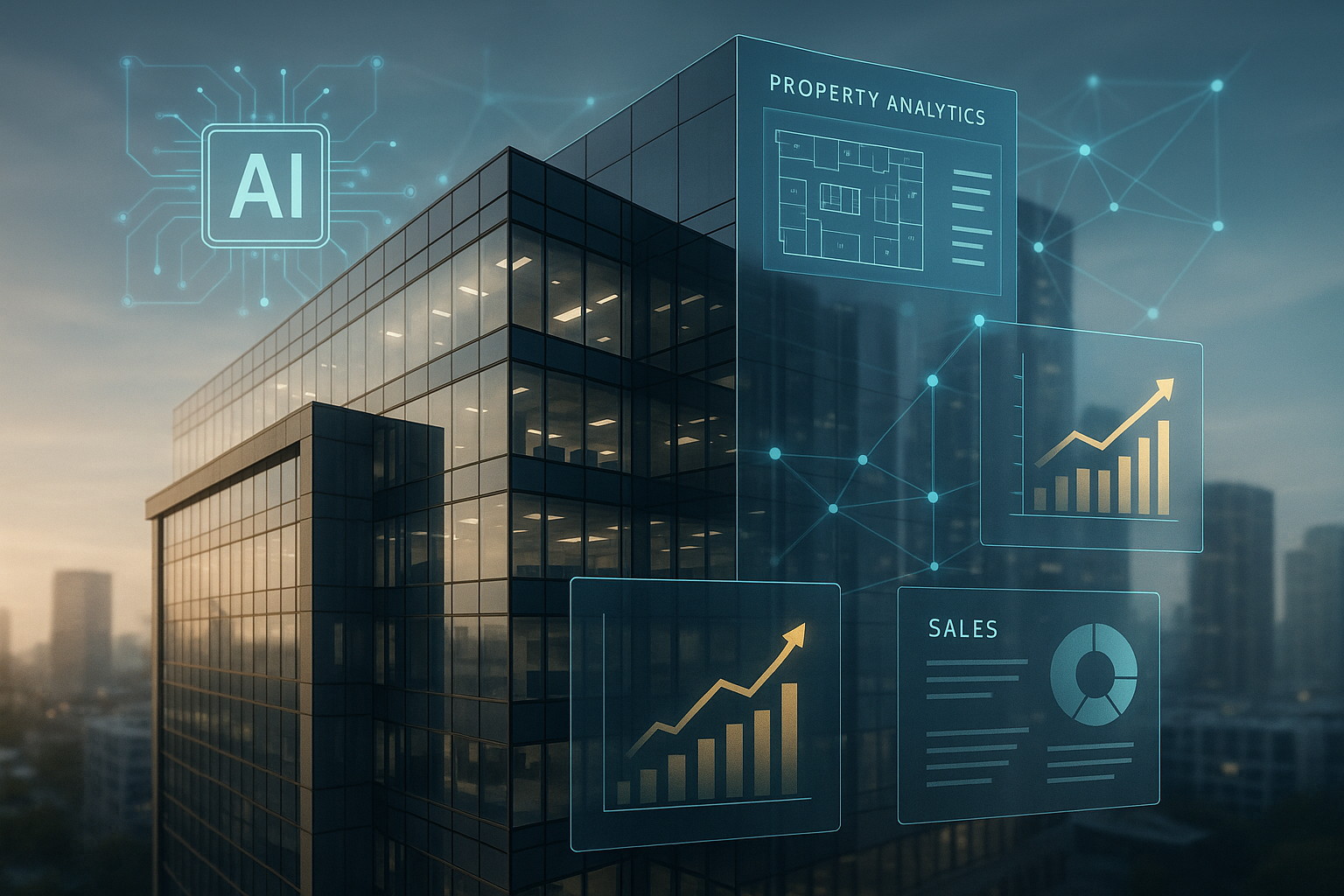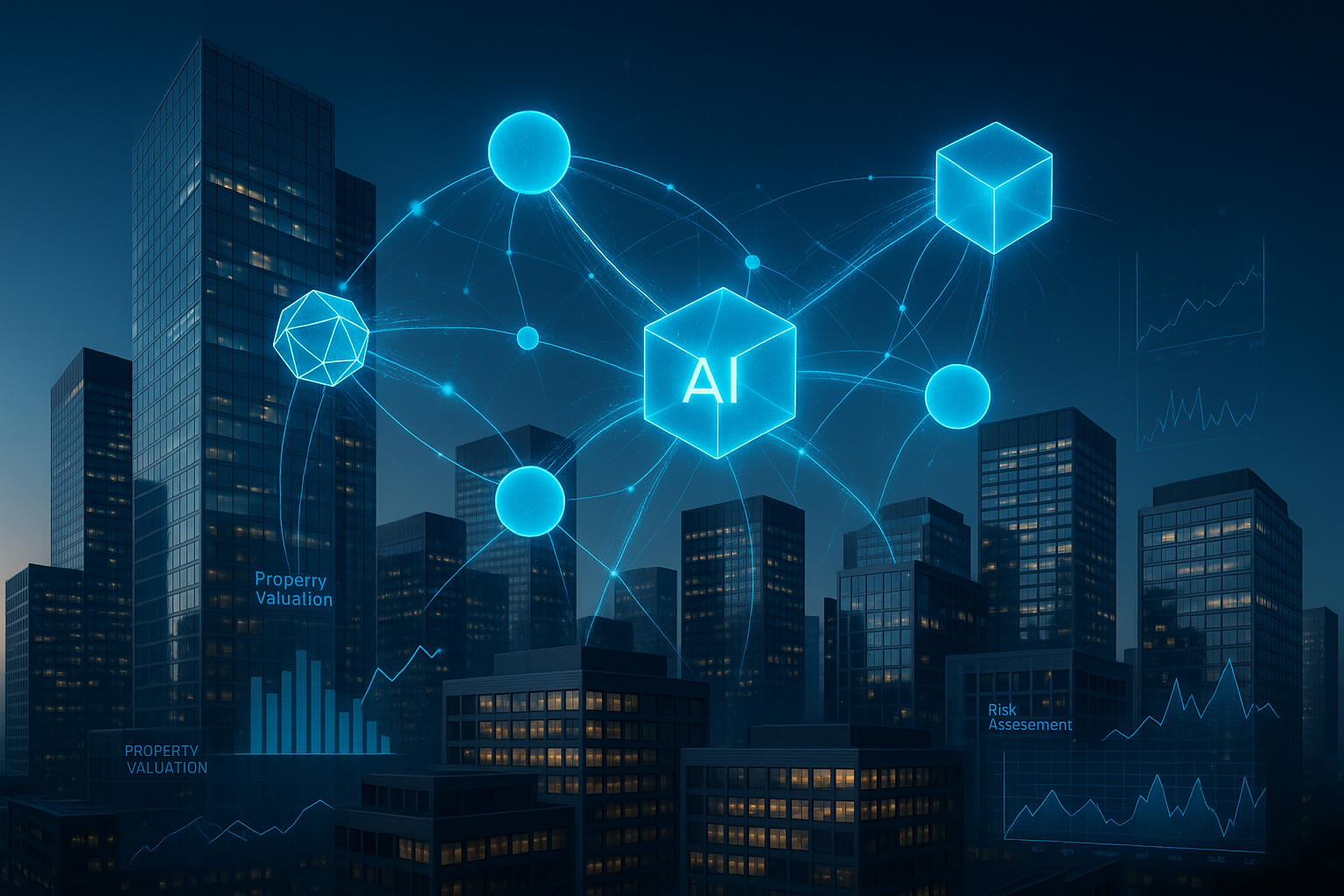
AI-Powered Smart Contracts in Real Estate: Complete 2025 Implementation Guide
Caiyman.ai Research Team
AI Solutions Architect
The real estate industry is experiencing its most significant transformation in decades. The AI in real estate market is projected to reach $301.58 billion in 2025 with a remarkable 35.5% compound annual growth rate, driven largely by the integration of artificial intelligence and blockchain technology. At the forefront of this revolution are AI-powered smart contracts, which are reducing transaction times by 30% and cutting costs by 50% compared to traditional real estate processes.
Yet despite these compelling advantages, 83% of property deals still fail without smart contract automation. This stark reality underscores both the immense opportunity and the urgent need for real estate professionals to understand and implement these transformative technologies. Leading platforms like Propy, Lofty, and RealT are already pioneering blockchain-AI integration, while companies such as Agreements.ai are streamlining contract creation and validation processes.
In 2025, smart contracts in real estate are no longer a futuristic concept—they're a present-day solution making traditional paperwork obsolete. This comprehensive guide provides real estate professionals, PropTech executives, and blockchain implementation teams with the practical knowledge needed to navigate this transformation successfully.
Technical Foundations: How AI-Powered Smart Contracts Actually Work
AI-powered smart contracts represent a fundamental evolution in how real estate transactions are executed and managed. These self-executing digital contracts with AI-enhanced decision-making capabilities combine the immutable security of blockchain with the intelligent automation of artificial intelligence to create unprecedented efficiency in property transactions.
At their core, smart contracts are programs that automatically execute predefined actions when specific conditions are met. Smart contracts could automatically release funds from a buyer's account to a seller's account once the property title has been transferred, eliminating the need for traditional intermediaries and reducing both time and costs.
The blockchain infrastructure provides tamper-proof transaction records and automated escrow systems that ensure complete transparency and security. Every transaction is logged on an immutable ledger, creating an audit trail that satisfies regulatory requirements while preventing fraud. AI enhancement takes this foundation further by adding intelligent decision-making capabilities, real-time risk assessment, and automated compliance verification.
Core Architecture Components
The technical stack behind AI-powered smart contracts includes several critical components. Blockchain platforms such as Ethereum and Hyperledger provide the foundational infrastructure for real estate applications, offering the security and decentralization necessary for high-value property transactions. These platforms support the deployment of smart contracts while ensuring network stability and transaction finality.
AI agents continuously monitor contract conditions and trigger automated actions based on real-time data analysis. These agents can process vast amounts of information—from property valuations and market conditions to regulatory compliance requirements—making intelligent decisions that would traditionally require human intervention. AI can play a role in managing these decentralized systems, for example, by providing analytics for tokenized asset performance.
Oracle integration serves as the critical bridge connecting off-chain property data to smart contracts. These oracles feed real-world information—such as property inspections, title verifications, and market valuations—into the blockchain environment, enabling smart contracts to make informed decisions based on current, accurate data.
Automated Workflow Examples
Consider a typical property transfer scenario enhanced by AI-powered smart contracts. Upon payment verification and title clearance, the system automatically triggers ownership transfer without requiring manual intervention from lawyers, escrow agents, or title companies. The AI component continuously validates that all conditions are met, checking everything from fund availability to regulatory compliance in real-time.
For rental income distribution and fractional ownership management, smart contracts can automatically calculate and distribute payments to multiple investors based on predetermined formulas. Smart contracts automate the sharing of rental income and manage ownership rights among all investors, making fractional real estate investment accessible and transparent.
Compliance verification and document validation processes become seamless through AI integration. The system can automatically verify that all regulatory requirements are met, flag potential issues, and ensure that transactions proceed only when all compliance conditions are satisfied.
Market Leaders and Platform Comparison: Choosing the Right Solution
The AI-powered smart contract ecosystem has matured significantly, with several platforms emerging as clear market leaders. Understanding the strengths and specializations of each platform is crucial for making informed implementation decisions.
Propy leads in end-to-end blockchain property transactions, offering a comprehensive platform that automates the entire property purchasing process. In 2023, Propy partnered with Inspectify to integrate property inspections into its blockchain system, with inspection reports automatically uploaded and AI-generated summaries made available to authorized parties. This integration demonstrates how AI can enhance traditional real estate processes while maintaining security and transparency.
Agreements.ai specializes in comprehensive contract validation and automated drafting capabilities. Their platform allows users to instantly understand complex contracts, draft agreements in minutes, and keep everything organized effortlessly, saving hours and reducing risk through advanced AI technology.
Lofty's tokenization platform has revolutionized accessibility by enabling investors to buy property shares for as little as $50. The platform offers daily rental income distribution and simplified property ownership through blockchain technology, making real estate investment accessible to a broader audience than ever before.
For commercial real estate, VTS (View The Space) and Cherre represent the premium tier of AI-driven management solutions. VTS is an AI-driven platform for commercial real estate, enhancing leasing, asset management, and tenant relationships through data analytics and workflow automation, with a rating of 4.6/5. Meanwhile, Cherre is an AI-powered platform that connects and analyzes real estate data, enabling smarter investment and management decisions, with a rating of 4.7/5.
Residential vs Commercial Platforms
The platform landscape divides clearly between residential and commercial applications. Residential-focused solutions like Lofty, Propy, and various fractional ownership platforms prioritize accessibility, user-friendly interfaces, and democratized investment opportunities. These platforms typically offer lower minimum investments, simplified onboarding processes, and consumer-focused features.
Commercial real estate platforms such as VTS, Cherre, and institutional investment management tools focus on sophisticated analytics, portfolio management capabilities, and integration with existing enterprise systems. These platforms serve institutional investors, REITs, and professional real estate managers who require advanced data analysis and comprehensive workflow automation.
Some platforms are developing hybrid solutions that serve both markets with scalable feature sets, allowing organizations to start with residential applications and scale up to commercial implementations as their needs evolve.
Integration and Compatibility Assessment
When evaluating platforms, API connectivity with existing property management systems becomes a critical consideration. Leading platforms offer robust integration capabilities with established systems like Yardi, MRI, and ARGUS, enabling organizations to leverage their existing technology investments while adding blockchain and AI capabilities.
Legacy system migration strategies require careful planning and often benefit from phased approaches. Successful implementations typically involve parallel running of old and new systems during transition periods, comprehensive data transfer protocols, and extensive testing to ensure data integrity.
Compliance with local regulations and international transaction requirements varies significantly by platform and jurisdiction. Organizations must carefully evaluate each platform's regulatory compliance features, particularly for cross-border transactions and jurisdictions with specific blockchain or AI governance requirements.
Implementation Best Practices: Security, Compliance, and Risk Management
Successful implementation of AI-powered smart contracts requires a comprehensive approach to security, compliance, and risk management. The stakes are particularly high in real estate, where transaction values are substantial and regulatory requirements are stringent.
Zero-trust architecture and multi-layered security protocols form the foundation of secure smart contract implementation. This approach assumes that no component of the system is inherently trustworthy and requires verification at every step. Multi-signature wallets, formal verification of contract code, and comprehensive access controls help ensure that only authorized parties can execute transactions.
Algorithmic bias auditing and explainable AI requirements have become essential for regulatory compliance. Preventing algorithmic bias, ensuring fairness, and maintaining transparency in AI-based property valuations are prerequisites for sustainable adoption. Organizations must implement regular auditing processes to ensure their AI models don't perpetuate market inequities or create unfair advantages for certain groups.
Regular security audits, penetration testing, and formal verification of contract code represent non-negotiable requirements for enterprise implementation. These processes should include both automated testing and third-party security reviews, with particular attention to edge cases and potential attack vectors that could compromise transaction integrity.
GDPR, CCPA, and Fair Housing Act compliance integration into automated workflows requires careful design and ongoing monitoring. Global compliance frameworks must be embedded into automated workflows, ensuring that AI-powered systems automatically enforce privacy requirements and fair housing regulations.
Emergency pause mechanisms and contract upgrade strategies provide essential error mitigation capabilities. Smart contracts, once deployed, can be difficult to modify, making it crucial to build in safeguards that allow for rapid response to security threats or regulatory changes while maintaining the immutability that makes blockchain valuable.
Stakeholder training and change management represent often-overlooked but critical success factors. AI literacy and training foster company-wide understanding of AI and smart contract fundamentals, especially focusing on how humans and AI collaborate in the new operational model.
Real-World Applications and Success Stories
The practical benefits of AI-powered smart contracts are already being demonstrated across the real estate industry, with measurable improvements in efficiency, cost reduction, and transaction security.
Institutional single-family rental (SFR) portfolio acquisition has been transformed through AI automation, with some platforms achieving 85% reduction in processing time for large-scale acquisitions. AI agents are orchestrated to monitor target markets for investment opportunities, source and underwrite qualifying properties across multiple channels, and automate document verification, contract analysis, and title transfers.
Tokenized real estate projects by major financial institutions demonstrate the technology's mainstream adoption. Significant examples include institutional tokenized funds by BlackRock (BUIDL), Franklin Templeton, DAMAC Group, and platforms like InvestaX, showing that even the most conservative financial institutions are embracing blockchain-based real estate solutions.
Geographic leadership in blockchain adoption is emerging clearly, with Dubai and Miami leading the pack in blockchain-based property transfers. These progressive markets expect widespread use of tokenization platforms by 2025-2026, followed by full blockchain integration in property deals between 2027-2030.
Fractional ownership success stories are democratizing real estate investment in unprecedented ways. Tokenization allows fractional ownership, enabling investors to buy property shares for as little as $50, making real estate investment accessible to millions of potential investors who were previously excluded by high minimum investment requirements.
Automated rent collection improvements provide tangible operational benefits, with one platform showing a 25% increase in on-time payments after implementing blockchain. These improvements result from automated payment processing, reduced manual errors, and enhanced tenant communication through integrated platforms.
International property transaction streamlining through blockchain verification has opened new markets for cross-border investment. Propy demonstrates how blockchain can streamline and secure international property transactions using smart contract technology to automate the property purchasing process.
Strategic Roadmap: Planning Your AI-Smart Contract Implementation
Successful implementation requires a carefully planned, phased approach that minimizes risk while maximizing learning and adaptation opportunities. The strategic roadmap should balance ambitious goals with practical constraints, ensuring sustainable adoption across the organization.
Phased deployment approaches consistently prove most successful, starting with pilot projects that demonstrate value before scaling systematically. Initial phases might focus on specific property types or transaction categories, allowing teams to gain experience and refine processes before broader implementation. This approach reduces risk while building internal expertise and stakeholder confidence.
Technology stack selection criteria should consider business size, transaction volume, and growth projections. Smaller organizations might benefit from all-in-one platforms like Lofty or Propy, while larger enterprises may require modular solutions that integrate with existing systems. The commercial real estate market might not be fully ready to adopt AI-powered smart contracts because different players in the industry use technology at different levels.
Change management strategies for legal teams, brokers, and operational staff require particular attention to role evolution rather than replacement. Support roles like "prompt engineer" or "AI contract auditor" as career evolutions for traditional legal, financial, and asset management professionals helps ensure staff buy-in and reduces resistance to technological change.
Budget planning for platform licensing, integration costs, and ongoing maintenance should account for both direct technology costs and indirect expenses such as training, change management, and temporary efficiency losses during transition periods. Organizations should also budget for ongoing security audits, compliance monitoring, and platform updates.
Timeline expectations vary significantly by market and organization size, but industry consensus suggests widespread tokenization adoption by 2025-2026, followed by full blockchain integration by 2027-2030. Early adopters can expect competitive advantages during this transition period, while late adopters may find themselves at significant disadvantages.
Partnership strategies with technology vendors and implementation consultants can accelerate deployment while reducing risk. Building partnerships with tech firms that specialize in real estate solutions may help promote adoption by showcasing successful examples and providing access to proven implementation methodologies.
The Future is Now: Why Immediate Action is Critical
The window for competitive advantage through early adoption of AI-powered smart contracts is rapidly narrowing. As the technology matures and regulatory frameworks stabilize, the benefits of being an early adopter are becoming increasingly apparent, while the costs of delayed adoption continue to mount.
Technology maturation is creating immediate competitive advantages for early adopters. Integrating AI with blockchain technology is unlocking the potential of smart contracts in property-related transactions, reducing reliance on intermediaries, streamlining paperwork, and expediting the closing process. Organizations that master these technologies now are positioning themselves to capture market share as the industry undergoes fundamental transformation.
Regulatory frameworks are stabilizing to support mainstream blockchain real estate adoption. As the market matures, regulatory bodies are likely to develop clearer guidelines for tokenization, reducing uncertainty and creating more predictable operating environments for blockchain-based real estate platforms.
Market differentiation opportunities are diminishing as technology becomes standard. What represents a competitive advantage today will become table stakes tomorrow. The adoption of AI in the real estate market is not just a trend but a necessity, and organizations that delay implementation risk being left behind by more agile competitors.
The cost of delayed adoption increases as manual processes become increasingly inefficient relative to automated alternatives. Smart contracts are no longer an experiment—they're an essential layer of real estate infrastructure in 2025.
Strategic positioning for next-generation real estate business models requires early implementation of foundational technologies. Organizations that establish AI-powered smart contract capabilities now will be best positioned to adapt to future innovations and market changes.
Transform Your Real Estate Operations with Expert AI Implementation
The transformation of real estate through AI-powered smart contracts represents both an unprecedented opportunity and a complex implementation challenge. Success requires not just understanding the technology, but developing comprehensive strategies that address technical, operational, regulatory, and organizational considerations.
Partner with Caiyman.ai for comprehensive AI and blockchain integration strategy tailored to your specific business needs. Our expertise in AI implementation and real estate technology enables us to guide organizations through every phase of smart contract adoption, from initial strategy development through full operational deployment.
Schedule a consultation to develop your customized smart contract implementation roadmap and technology selection guidance. Our team combines deep technical expertise with practical real estate industry experience, ensuring that your AI-powered smart contract implementation delivers measurable results while maintaining the security and compliance standards your business requires.
Sources
- How AI is Changing the Landscape of Real Estate Finance - Kurby Real Estate AI
- AI and Blockchain: The Dynamic Duo Transforming Real Estate Transactions - Agreements.ai
- AI in Real Estate Market Report - The Business Research Company
- Smart Contracts and AI: Simplifying Real Estate Transactions - Damco Group
- Top Blockchain-Based Real Estate Platforms - Lofty AI
- Blockchain Real Estate 2025: Smart Contracts Powering Secure Property Transactions
- AI in Institutional CRE Analysis - Research Document
- AI in Real Estate: Use Cases, Benefits & Trends - Invensis
- Smart Contracts In Real Estate: Why 83% Of Property Deals Still Fail Without Them - Primior
- Smart Contracts for Real Estate: 8 Game-Changing Use Cases in 2025 - Antier Solutions
- Top Real Estate Technology Trends Shaping 2025 - Quest Org
- Real Estate Tokenization: The Ultimate Guide for Investors in 2024 - Rapid Innovation
Share this article
Related Articles

AI-Powered Smart Contracts: Revolutionizing Real Estate Finance in 2025
Discover how AI-powered smart contracts and blockchain technology are transforming real estate finance with automated transactions, tokenization, and revolutionary platforms driving $301.58 billion in market growth.

AI Sales Agents Transform Real Estate: $4M Uniti AI Funding Signals Industry Revolution
Uniti AI's $4M funding signals a major shift toward AI-powered sales agents in real estate, promising to automate 37% of CRE tasks and deliver $34 billion in efficiency gains by 2030.

Multi-Agent AI Systems Transforming Commercial Real Estate Finance in 2025
Discover how multi-agent LLM frameworks are revolutionizing CRE finance, with 60% of institutional investors now using AI for underwriting and asset management while achieving 20% reductions in valuation discrepancies.